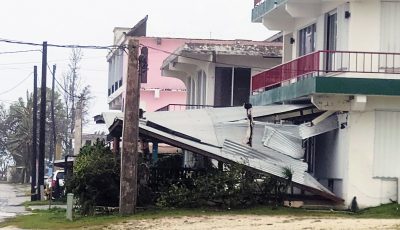IN PROCEEDINGS TO DECLARE BUDGET ACT UNCONSTITUTIONAL
Justices deny govt petition to stop judge from hearing motion
The CNMI Supreme Court yesterday denied the government’s petition to prevent Superior Court Associate Judge Joseph N. Camacho from proceeding with a hearing pertaining to a request to declare the 2016 Budget Act unconstitutional.
The high court justices ruled that while they are tempted to halt Camacho’s post-judgment proceedings, there is no order, at this juncture, directing the Legislature to appropriate funds.
“In sum, issuance of a writ is not proper because the Commonwealth failed to demonstrate a clear jurisdictional error of the lower court and the other issue presented by the Commonwealth may be reviewable on appeal,” said the high court’s ruling issued by Chief Justice Alexandro C. Castro and Associate Justices John A. Manglona and Perry B. Inos.
The justices denied the government’s petition for a writ of prohibition.
Last April, Chief Justice Castro granted the government’s emergency motion to stop all proceedings in the Superior Court pertaining to such request to declare the 2016 Budget Act unconstitutional.
In that order, Castro said all trial court proceedings in this matter are stayed pending the high court’s decision on the government’s petition to prohibit Camacho from proceeding with the hearing on the motion to declare the 2016 Budget Act unconstitutional.
Assistant attorney general David Lochabay, counsel for the government, asserted that Camacho should stay further proceedings pending the CNMI Supreme Court’s decision on the government’s petition to prohibit the judge from hearing on the budget issue.
Lochabay filed the motions after Camacho issued an order last Feb. 8 allowing the parties to call any witnesses at the evidentiary hearing who will be helpful in deciding the constitutionality of the 2016 Budget Act, including members of the Legislature.
Camacho set the evidentiary hearing for May 9, 2016.
Lochabay also filed the petition for a writ of prohibition, asking the high court to prohibit Camacho from proceeding with a hearing on the motion to declare the 2016 Budget Act unconstitutional.
Attorney Michael Dotts has argued that the Budget Act of 2016 is unconstitutionally unbalanced under the CNMI Constitution because it did not provide for the payment of judgments in a reasonable amount.
Dotts is counsel for plaintiffs Jotonia B. Aguon, Timothy Cruz, and Gorgonny Camacho.
Aguon and Cruz are holding a $35,000 judgment against the government in connection with their lawsuit over the death of their child at the Commonwealth Health Center.
Gorgonny Camacho is holding a $10,000 judgment against the government in connection with his medical malpractice lawsuit against CHC.
To collect payment of the two judgments that were entered in 2013, Dotts filed motions for orders in aid of judgment. He asked the Superior Court to declare the 2016 Budget Act unconstitutional. The two cases were consolidated.
In the government’s petition for a writ, Lochabay argued that Camacho’s order directing the plaintiffs to file a stand-alone motion challenging the constitutionality of the 2016 Budget Act is clearly erroneous because the court lacks jurisdiction.
Lochabay also argued that Camacho’s order in aid of judgment proceedings is improper because the constitutionality of the Budget Act has no bearing on the Commonwealth’s means to pay the debt.
In the order yesterday denying the government’s petition, the justices said issuance of a writ of prohibition is a drastic remedy invoked only in “the most dire of instances.”
The justices said while the procedural posture of this case is unique, the Commonwealth fails to persuade them that Camacho’s assumption of jurisdiction amounts to a usurpation of power.
The justices said given the judicial power and jurisdiction over cases in law and equity vested by the NMI Constitution, they cannot conclude that the Superior Court lacks jurisdiction to examine the constitutionality of a public act enacted by the Legislature, namely the 2016 Budget Act.
Lochabay further asserted that constitutionality of the Budget Act does not properly bear upon the question of its ability to pay unsatisfied judgments.
Dotts argued that a budget that ignores its liabilities is contrary to the mandates of the NMI Constitution and thus, a determination regarding the constitutionality of the Budget Act is necessary in informing the trial court the fastest way the Commonwealth can pay the debt.
The justices said regardless of the respective merits of these arguments, they are not convinced that they must address this issue because the Commonwealth can appeal the trial court’s ruling should the budget be declared unconstitutional.
The justices said the trial court may be inclined to remedy the apparent injustice present in this case because the plaintiffs suffered personal injuries and are unable to collect from the Commonwealth notwithstanding the stipulated judgments.
Nevertheless, the justices said, their ruling in the Marine Revitalization Corp. case is the current law of this jurisdiction, and the trial court cannot override the high court’s decision.
In the Marine Revitalization case, the high court held that the courts do not have the power to—directly or indirectly—order the appropriation of funds to satisfy judgments against the Commonwealth.



























